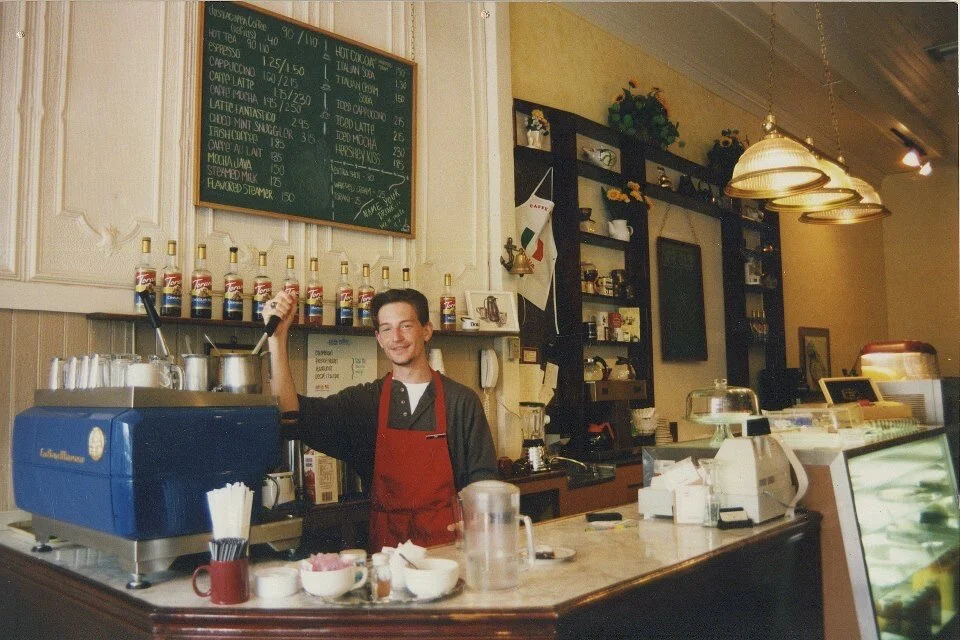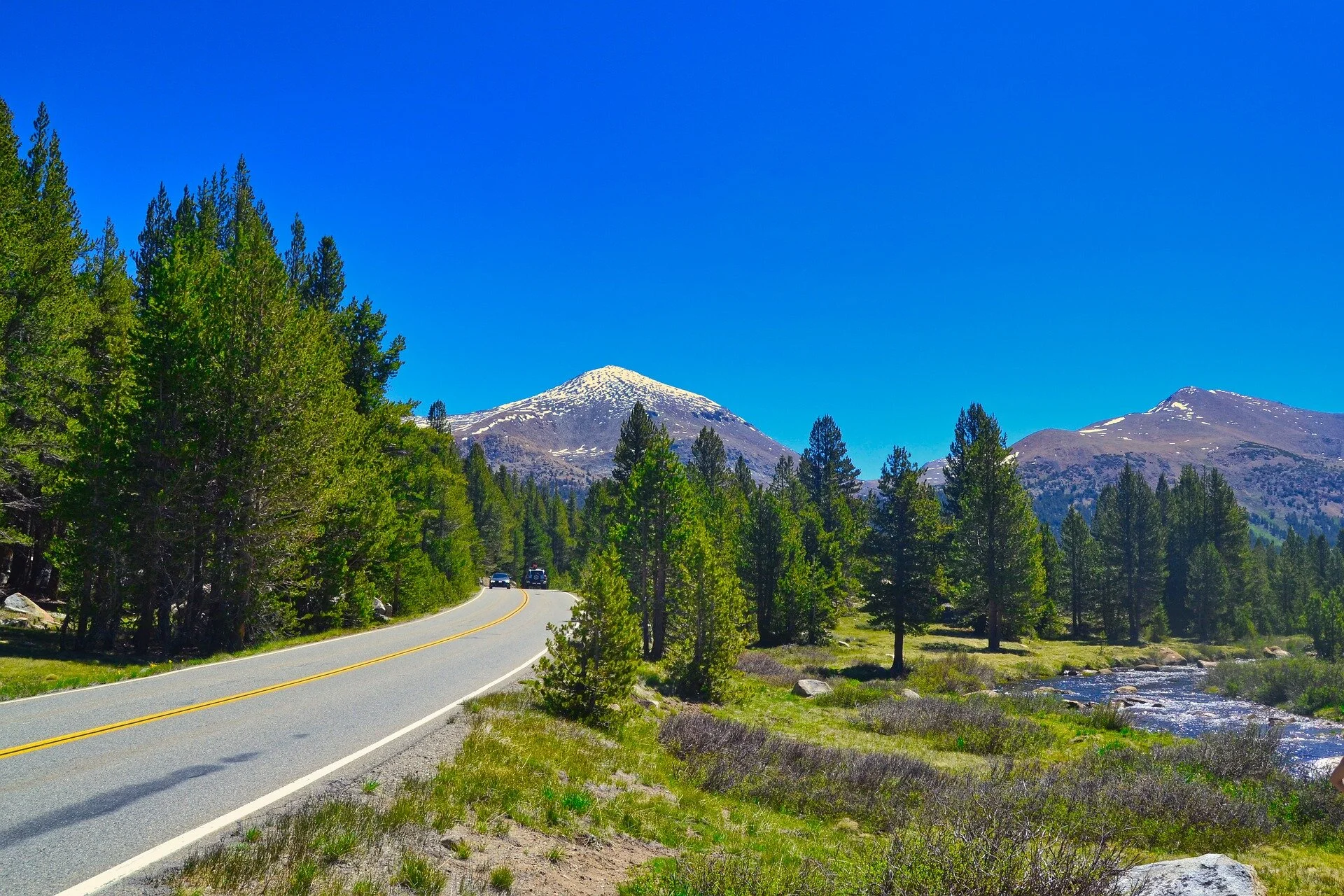Saturday Mornings at Caffe Dolce: Pre-Philosophical Days of Purpose
(Zachary Fruhling, age 17, at Caffe Dolce, 547 Main Street, Vacaville, California, September 1995)
When I was a teenager I worked at a locally owned Italian coffeehouse in my hometown, Caffe Dolce—a name to be spoken aloud only with great reverence. It was a formative time for me, as I was extremely shy in public school and being a barista, pulling espresso shots and chatting up customers, went a long way towards getting me out of my shell.
So much of my subsequent work experience has been very heady—from grad school and teaching to my professional work as an author, educational content developer, and instructional designer. But working at Caffe Dolce was different. It was, to coin a phrase, pre-philosophical. Intellectual work consists largely of time in one’s own head and in front of a computer screen. Being a barista at a coffeehouse, however, is radically immersive, the epitome of what German philosopher Martin Heidegger called “Being-in-the-World” (“In-der-Weld-Sein”).
To this day I can close my eyes and summon within my memory the complex swirl of sensations of a Saturday morning at Caffe Dolce: the sound of the coffee and espresso grinders, the taste of that precious first cup of Peerless Coffee fresh out of the brewer, the heat emerging from the espresso machine heralding the morning as much as any sunrise (the very source of life-giving warmth in a coffeehouse!), the sound of kitchen dishes clanking as Donna (one of the owners of Caffe Dolce) baked her famous scones, biscotti, muffins, and other assorted fare for the day, each of which had its own distinctive aroma filling the senses with morning goodness; the sounds of the music flowing from the speakers (often Barry Manilow’s Singin’ with the Big Bands or the Moonstruck soundtrack); the sea of familiar faces and voices of our regular customers, many of whose drink orders I can still remember even after 25+ years; the muscle memory of every movement associated with pulling espresso shots with our manual lever-operated La San Marco espresso machine, the use of which transcended the subject-object distinction as well as any example of embodied immersiveness that Heidegger himself ever cited, and the rhythm of which was every bit as seductive as a dance and as fluid as a lover’s embrace; the sounds and smells of the empty Vacaville streets as I wheeled a too-full cart of supplies down Main Street to our booth at the Farmer’s Market; and countless other sensations that blended together seamlessly to form my collective memory of that particular time and place.
Saturday mornings at Caffe Dolce were days of purpose, as indeed every day was back then, but, again, in a pre-philosophcial way. Oftentimes I would spend the night at John and Donna’s place (the owners) the night before after an evening spent pulling espresso shots to the jazzy rhythms of the Dave Tyesi Trio or whichever local musicians were the attraction of the week, chatting with smiling customers of every variety in a scene reminiscent of Billy Joel’s Piano Man. After work on a Friday night, John I would stay up late drinking a glass of wine, smoking Arturo Fuente cigars, and talking of everything under the sun: life, love, God, women, philosophy, and friendship. Then the three of us—John, Donna, and I—would arise before dawn and head to the caffe to begin the morning routine, expecting a busy and prosperous day fueled by caffeine and camaraderie.
My pre-philosophical Saturdays of purpose at Caffe Dolce didn’t end with the morning. Quite frequently some of us employees and/or customers would go out to lunch after the morning shift while the Caffe was closed in the middle of the day to prepare for a busy Saturday evening. The swirl of sensations I recall extends to the rest of the day: the sound of the jukebox at Pietro’s #1 in Vacaville (a common post-Saturday-morning lunchtime destination), the lightheartedness and warmth of conversation and laughter over lunch, and other assorted noonday minutiae. Even after lunch, I would commonly go home, get a shower and freshen up, even if I wasn’t working later that evening, and I would return to Caffe Dolce as a customer to enjoy the live music and to meet up with friends, family, or coworkers for cappuccinos, cigars, laughter, and conversation—and sometimes even for an occasional date whom I was trying to woo with that very rhythmical seductiveness and immersive swirl of coffeehouse sensations I described previously—to various degrees of success.
Why was I so invested in this time at Caffe Dolce? It was real community, real immeriveness, a real sense of Being-in-the-World and Being-with-Others (two essential aspects of human authenticity, according to Heidegger), real purpose—pre-philosopical purpose—and real authenticity that I’ve perhaps been trying to recapture and find once again ever since. As my professional life has become more and more intellectual, and as we collectively, as a culture, spend more and more of our time isolated on social media and staring at digital screens of all sizes, we are all in danger of becoming less immersed in the world, in Heidegger’s sense, and instead stuck inside our own headspace all day while sucked into various overlapping digital worlds in some postmodern technological equivalent of Plato’s Allegory of the Cave—staring at mere shadows and phantasms in search of real meaning and purpose instead of immersing ourselves completely in a world full of embodied sensations and pleasures—and authentically being with others.







